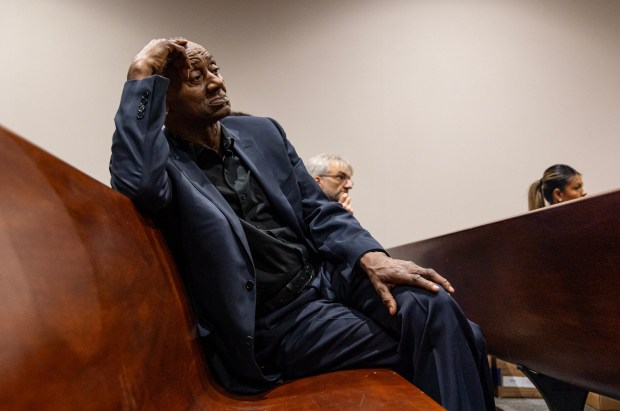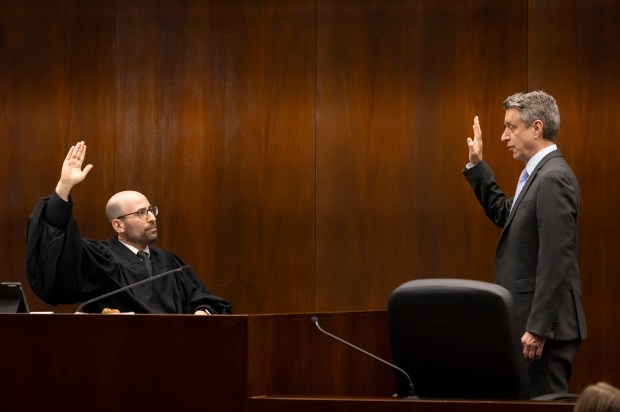Nearly a year after a rare appeal stopped a trial in its tracks for two former Cook County assistant state’s attorneys, the case is expected to resume on Monday as special prosecutors allege wrongdoing in connection with an infamous wrongful conviction case.
Nicholas Trutenko, 69, and Andrew Horvat, 48, are facing felony charges in connection with the third trial for Jackie Wilson, whose case was critical to unveiling systemic practices of torture within the Chicago Police Department.
The trial is unusual both for the fact that county lawyers are standing trial in connection with a wrongful conviction case and for the many procedural twists in the multi-decade saga that began in 1982 with the fatal shootings of Chicago police Officers William Fahey and Richard O’Brien.
Trutenko, who prosecuted Wilson in the officers’ killings, is charged with perjury, official misconduct, obstruction of justice and violating a local records act in relation to his testimony as a witness at Wilson’s third and final trial in 2020. Horvat, who represented Trutenko in that proceeding when he was an attorney with the office’s Civil Actions Bureau, is accused of official misconduct.
The trial first began last October before Lake County Judge Daniel Shanes, who will rule following a bench trial because the Cook County judiciary was recused from hearing the case.
But in a shocking turn, the trial was halted when Shanes — in a ruling sharply critical of the Cook County state’s attorney’s office — prohibited a key prosecution witness from large swaths of expected testimony because he found that the witness, Paul Fangman, another assistant state’s attorney, was bound by attorney-client privilege with Trutenko.
“The court is shocked by the failure of the Cook County state’s attorney’s office to ensure their assistants know when and how attorney-client relationships form, and to take appropriate steps to make sure an attorney-client relationship only forms when one is intended,” Shanes said. “Issues like these threaten the very foundation of the practice of law and undermine public confidence in the law.”
But an Illinois Appellate Court that reviewed the ruling upon an appeal by special prosecutors took issue with Shanes’ decision in a 50-page reversal. In oral arguments in June, the justices had appeared skeptical that Fangman represented Trutenko in his personal capacity, rather than the state’s attorney’s office.
“I think (Foxx) has been vindicated. I think the office’s position has been vindicated. And I think the judge’s critical remarks have been pretty much thrown out,” said Joel Bertocchi, a private practice attorney who intervened and argued on behalf of the state’s attorney during the appeal, after the Appellate Court decision.
Now, after an 11-month interlude, attorneys will turn back to the question of whether Trutenko and Horvat violated the law in connection with Wilson’s 2020 trial, which imploded when special prosecutors handling the case dropped the charges shortly after learning of the extent of a friendship between Trutenko and a witness who years earlier had testified against Wilson.
The bizarre friendship between Trutenko and William Coleman, a British con man who named Trutenko as godfather to one of his children, has largely been at the center of the matter.
In his opening statement last year, special prosecutor Lawrence Oliver II alleged that during Wilson’s third trial in 2020, Trutenko hid his 30-year friendship with Coleman, who testified against Wilson in his 1989 trial prosecuted by Trutenko. The prosecutor then lied on the stand during that trial when defense attorneys asked if he discussed Coleman in prep sessions with special prosecutors, Oliver said.
“Most disturbing is when public officials who are sworn to be guardians of people as well as processes … fail in their obligations and operate above the law,” Oliver said.
Oliver alleged that Horvat, who represented Trutenko, failed to “take obligatory and rudimentary steps to avert continued concealment of information about Trutenko and Coleman.”
He argued that this concealment meant that attorneys were not able to locate Coleman, which deprived Wilson of his right to access potentially exculpatory evidence because a judge had ruled that trial transcripts with Coleman’s 1989 testimony could be read into the record.
Defense attorneys, though, argued that Trutenko misunderstood the question while on the stand, having to recall details about an old case.
Horvat’s attorney further argued that he was bound by attorney-client privilege to Trutenko.
The case began more than 40 years ago when Jackie Wilson, then 21, was behind the wheel of a car with his brother Andrew Wilson, who shot and killed the two officers.

Jackie Wilson has said he did not know his brother would shoot the officers, but in 1989, at his second trial, Coleman testified that Wilson had admitted his role in the crime while they were locked up together in the county jail.
A judge later determined Wilson’s attorneys were not fully informed about a deal given to Coleman in exchange for his testimony. The same judge also ruled that Jackie Wilson’s confession had resulted from torture and vacated his conviction.
Special prosecutors were attempting to try Wilson for a third time when they dropped charges after hearing Trutenko’s testimony.


